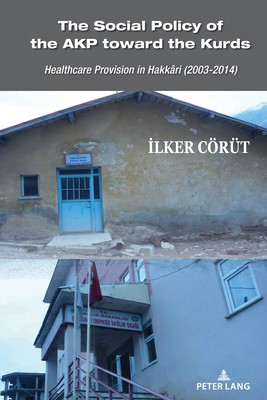
- We will send in 10–14 business days.
- Publisher: Peter Lang Inc., International Academic Publishers
- ISBN-10: 1433195763
- ISBN-13: 9781433195761
- Format: 15.2 x 22.9 x 2.1 cm, hardcover
- Language: English
- SAVE -10% with code: EXTRA
The Social Policy of the Akp Towards the Kurds (e-book) (used book) | bookbook.eu
Reviews
Description
This research focuses on the period 2003 to 2014, which was exceptional in the history of the Turkish Republic for its radical shift in the official stance adopted towards Kurds. The overall Kurdish policy of the AKP in 2003-14 was part of a wider agenda of refashioning the nation on an anti-Kemalist, anti-elitist, and essentially pro-Muslim basis. This reconstruction of the nation was built on the populist claim to be ending the varying levels of social and cultural exclusion that the religious masses, Kurds, informal employees, and poorly educated rural masses had been subject to as subaltern groups of the Republic. This policy did not work. The AKP failed to establish Turkish hegemony over Kurds and could not suppress the Kurdish national movement. This book looks for an explanation of the failure of the Kurdish policy of the AKP by considering the limits of its social policy in instituting a compliant, cooperative, submissive Kurdish subjectivity. To do this, it focuses on the persistence of patient dissatisfaction in Hakkâri, a small Kurdish province, during the period despite the very considerable improvements to healthcare provision achieved in these years. The empirical findings of this study show that the persistence of patient dissatisfaction in Hakkâri as a mass phenomenon was essentially a daily symptom of an ethnopolitical resistance to being interpellated by the AKP as citizens-in-the-making who would compare past and present, realize the progress, and thus appreciate the current quality of healthcare provision by tolerating any shortcomings as a minor price to pay for relative material comfort. In short, the limit of the AKP strategy was the limit reached in an attempt to carry out a sort of politics of redistribution that tried to convince Hakkârians to be content with a situation that fell short of full respect to their identity and bodies.
EXTRA 10 % discount with code: EXTRA
The promotion ends in 19d.17:57:27
The discount code is valid when purchasing from 10 €. Discounts do not stack.
- Publisher: Peter Lang Inc., International Academic Publishers
- ISBN-10: 1433195763
- ISBN-13: 9781433195761
- Format: 15.2 x 22.9 x 2.1 cm, hardcover
- Language: English English
This research focuses on the period 2003 to 2014, which was exceptional in the history of the Turkish Republic for its radical shift in the official stance adopted towards Kurds. The overall Kurdish policy of the AKP in 2003-14 was part of a wider agenda of refashioning the nation on an anti-Kemalist, anti-elitist, and essentially pro-Muslim basis. This reconstruction of the nation was built on the populist claim to be ending the varying levels of social and cultural exclusion that the religious masses, Kurds, informal employees, and poorly educated rural masses had been subject to as subaltern groups of the Republic. This policy did not work. The AKP failed to establish Turkish hegemony over Kurds and could not suppress the Kurdish national movement. This book looks for an explanation of the failure of the Kurdish policy of the AKP by considering the limits of its social policy in instituting a compliant, cooperative, submissive Kurdish subjectivity. To do this, it focuses on the persistence of patient dissatisfaction in Hakkâri, a small Kurdish province, during the period despite the very considerable improvements to healthcare provision achieved in these years. The empirical findings of this study show that the persistence of patient dissatisfaction in Hakkâri as a mass phenomenon was essentially a daily symptom of an ethnopolitical resistance to being interpellated by the AKP as citizens-in-the-making who would compare past and present, realize the progress, and thus appreciate the current quality of healthcare provision by tolerating any shortcomings as a minor price to pay for relative material comfort. In short, the limit of the AKP strategy was the limit reached in an attempt to carry out a sort of politics of redistribution that tried to convince Hakkârians to be content with a situation that fell short of full respect to their identity and bodies.


Reviews